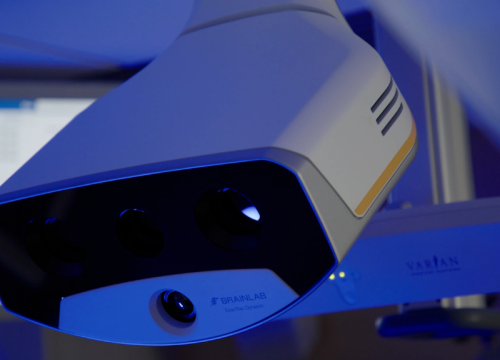Multiple myeloma is the No. 2 most common blood cancer in the United Sates. This disease affects the white blood cells, called plasma cells in your bone marrow. Despite the challenges it presents, advancements in new treatment can help you live longer and with fewer symptoms.
At Valley’s Center for Blood Disorders, our hematologic oncology team specializes in diagnosing and treating this type of blood cancer. Through our affiliation with the Mount Sinai Health System, you will have access to additional clinical trials and innovative treatments for multiple myeloma and other related conditions.
Multiple Myeloma Symptoms
Sometimes, multiple myeloma doesn’t cause any immediate symptoms. Often, the first indication is an abnormal blood or urine test. In this case, your primary care doctor may refer you to a hematologist/oncologist (a doctor who specializes in blood cancers) for further testing.
When patients do experience signs of multiple myeloma, symptoms may include:
- Back, hip, chest, or pelvic pain
- Fractures (broken bones)
- Jaw pain or toothaches
- Fatigue and weakness
- Pain or numbness in the arms or legs
- Leg swelling
- Nausea
- Unexplained weight loss
- Shortness of breath
Multiple Myeloma Diagnosis at Valley
At Valley, we’ll take your medical history and examine you on your first visit. Your hematologist/oncologist may also recommend tests, such as:
- Blood tests, which can check for irregularities in your blood cells and signs of anemia (low red blood cells). Blood tests can also check your kidney function, which multiple myeloma can affect.
- Imaging tests, such as bone X-rays, computed tomography (CT) or magnetic resonance imaging (MRI). We may also suggest an echocardiogram or cardiac MRI to check your heart muscle, which multiple myeloma can damage.
- Bone marrow biopsy, which uses a needle to take a small sample of your bone marrow.
- Genetic testing, which can identify genetic mutations and chromosome changes.
Multiple Myeloma Treatment at Valley
Treatment can help bring your multiple myeloma into remission — allowing you to live longer, with fewer symptoms. Your Valley hematologist/oncologist may suggest one or more treatment options based on your disease, overall health, and personal goals.
Multiple myeloma treatments at Valley include:
- Chemotherapy
- Immunotherapy
- Targeted therapy
- Bispecific antibody therapy
- Radiation therapy
- Pain management
- Orthopedic surgery
Chemotherapy
We often recommend chemotherapy to kill cancer cells in your bone marrow. At Valley, chemotherapy is offered at our Ambulatory Infusion Center.
Immunotherapy
Recent advancements in immunotherapy offer new hope for multiple myeloma patients. Immunotherapy drugs use your body’s defense system to help keep multiple myeloma under control. At Valley, our hematologists/oncologists are involved in clinical trials testing for groundbreaking and innovative immunotherapy treatment options for multiple myeloma.
Bispecific Antibody Therapy
Bispecific antibodies, a type of novel immunotherapy, are promising new medicines for multiple myeloma. Bispecific antibodies help your immune system rapidly target and kill cancer cells.
Radiation Therapy
Your team may recommend radiation therapy, which uses high-energy beams to shrink tumors and help manage bone pain, improving your quality of life.
Supportive Services
Pain Management
We understand how pain from multiple myeloma can affect every aspect of your life. Our pain management team offers effective treatments to ease your discomfort. Therapies include pain medication, acupuncture, nerve blocks, and physical therapy. We may also recommend medicines to strengthen your bones and reduce pain.
Orthopedic Surgery
Because multiple myeloma can weaken your bones, you may develop fractures in your spine. If needed, our neurosurgeons and orthopedic surgeons can use the latest spine surgery techniques, including minimally invasive spine surgery, to stabilize your spine.
Why Choose Valley for Multiple Myeloma Care?
Top cancer care in New Jersey: Valley is committed to excellence in cancer care, and has been recognized for providing the highest quality cancer care with the Quality Oncology Practice Initiative (QOPI) certification for high-quality services.
Access to new leading research and clinical trials: The Center for Blood Disorders participates in innovative clinical trials and research, offering diverse treatment options for blood cancer patients. Our hematologists/oncologists lead and participate in clinical trials of promising treatments for multiple myeloma, so you have access to the latest treatment options and clinical trials. We’re also part of Mount Sinai’s MyTRO, which can connect you to research centers testing new drugs for multiple myeloma.
Holistic approach to care: Valley is committed to providing a holistic approach to address all aspects of our patients' lives, ranging from the medical, emotional, spiritual, and financial challenges of living with blood cancer, close to home. Our dedicated team of professionals works together to create a personalized treatment plan for each patient, ensuring comprehensive care.
Open communication with your care team: We emphasize open communication, promptly addressing any questions you may have about your care and treatment.
Diagnosis without a long wait: We know that waiting for a cancer diagnosis can be distressing, especially if you received an unclear diagnosis elsewhere. Our hematologists/oncologists will work tirelessly with radiation oncologists, pathologists, surgeons, and others at Valley to get you answers. Together, we’ll also recommend treatments that offer the best chance for managing your cancer.
Mount Sinai affiliation: Our alliance with the Mount Sinai Health System allows access to leading-edge cancer services, including expert reviews for a built-in second opinion. Valley’s partnership with the Mount Sinai Health System means you can receive more innovative treatments like CAR T for multiple myeloma. We can also arrange a stem cell transplant at Mount Sinai if you qualify.
Supportive care for you and your family: Our cancer support services can help you and your family with your medical, spiritual and emotional needs during treatment from scheduling appointments and treatments to handling financial concerns, we can assist you with the help of our resources.
















